“I don’t know.” Two simple words that once felt impossible for me to say. Instead, I’d guess, overexplain, or pretend confidence anything but admit uncertainty. Why? Because not knowing triggered old anxieties about being seen as weak, incompetent, or unsafe. That’s the hidden discomfort behind saying ‘I don’t know.’
Table of Contents
- Introduction
- Why Saying “I Don’t Know” Feels So Hard
- How This Anxiety Impacts Your Mind and Body
- Common Situations That Trigger the Discomfort
- Practical Ways to Embrace Uncertainty
- Acknowledge the Old Story
- Reframe “I Don’t Know” as Strength
- Practice Small Admissions
- Soothe Your Nervous System
- Let Go of Perfectionism
- Embrace Curiosity Over Pressure
- Saying “I Don’t Know” and the LGBTQ+ Experience
- Q&A: Your Questions Answered
- Conclusion: You’re Allowed to Not Know Everything
- Why Am I So Uncomfortable Talking to People I Don’t Know?
- Why Do I Feel Uncomfortable for No Reason?
- Why Do I Feel Uncomfortable Being Seen?
- Why Do I Struggle with Communicating or Talk Awkwardly?
- Why Do I Feel Uncomfortable in Silence?
- Conclusion: Embracing Your Unique Communication Style
Struggling to say “I don’t know”? Discover why this phrase feels so hard and learn practical ways to embrace uncertainty with confidence. Start your journey today!
Introduction
Ever been in a meeting or a convo with friends and someone asks you a question you don’t have an answer for? Your heart races, your palms get sweaty, and instead of saying “I don’t know,” you start rambling or faking confidence. Oh man, I totally get it. 😅 Back in college, I was in a group discussion, and when the professor asked me something I hadn’t prepped for, I froze. I mumbled some half-baked answer, terrified they’d think I was clueless. That fear of admitting uncertainty? It’s real, and it’s called the anxiety of not knowing.
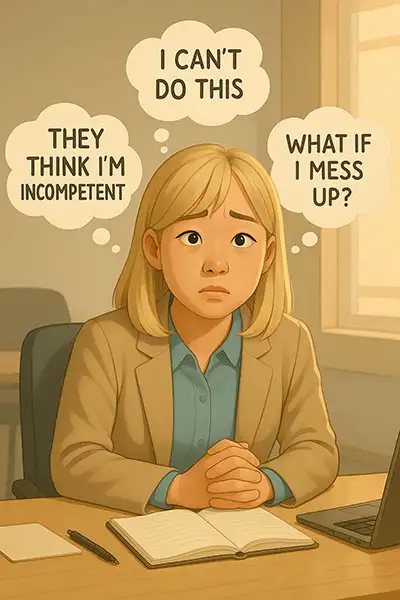
This discomfort can hit hard, especially for folks in the LGBTQ+ community, who might feel extra pressure to seem “put-together” in spaces that don’t always feel safe.
In this guide, we’ll dig into why saying “I don’t know” feels so threatening, how it affects your mind and body, and practical steps to get comfy with uncertainty. Whether it’s a work meeting or a personal question, you can learn to say those two little words with confidence.
Ready to let go of the pressure to know it all? Let’s dive in! 🚀
Why Saying “I Don’t Know” Feels So Hard
Saying “I don’t know” can feel like admitting defeat, but it’s not just you there’s some serious psychology behind it. Here’s why it’s so tough:
- Perfectionism’s Grip: If you’re a perfectionist (yep, guilty!), you might tie your worth to having all the answers. Not knowing feels like failure. I used to think every unanswered question in class was a mark against my intelligence.
- Childhood Conditioning: Growing up, you might’ve been shamed for not knowing something like a teacher calling you out or a parent saying, “You should know this by now.” Those moments stick, making uncertainty feel unsafe.
- Fear of Judgment: In social or work settings, you might worry that admitting uncertainty will make you look incompetent or untrustworthy. Psychology Today explains that this fear often stems from a need for social approval.
- Control and the Nervous System: Your brain craves control, and uncertainty feels like chaos. When you don’t have an answer, your nervous system might kick into fight-or-flight, making you feel on edge.
For LGBTQ+ folks, this discomfort can be amplified by societal pressures to prove your worth in environments that might judge your identity. Saying “I don’t know” can feel like giving critics more ammo, but it’s actually a sign of strength.
Why Admitting Uncertainty Feels So Threatening
- Perfectionist conditioning equates knowledge with worth
- Childhood shame for not having answers
- Fear of losing credibility in relationships or work
- Control-seeking nervous systems panic at unpredictability
How This Anxiety Impacts Your Mind and Body
The fear of saying “I don’t know” isn’t just mental it takes a toll on your body too. Here’s how:
- Fight-or-Flight Response: When you’re put on the spot, your nervous system might react like you’re facing a threat, spiking your heart rate or making you sweat. I’d get this knot in my stomach every time I didn’t know an answer at work.
- Overexplaining to Compensate: To avoid looking clueless, you might ramble or give vague answers, which can leave you feeling drained. Harvard Health notes that this stress response can increase anxiety over time.
- Struggling with Ambiguity: If you can’t tolerate uncertainty, you might avoid situations where you don’t have all the answers, limiting your growth.
- Shame Spirals: After admitting you don’t know, you might beat yourself up, thinking, “I should’ve known that.” This self-criticism can chip away at your confidence.
These effects can make you feel stuck, but the good news is you can learn to handle uncertainty with ease.
How This Fear Impacts The Nervous System
- Fight-or-flight activates when uncertain
- Overexplaining to compensate for perceived lack
- Difficulty tolerating ambiguity or unresolved questions
- Inner shame spiral after admitting gaps
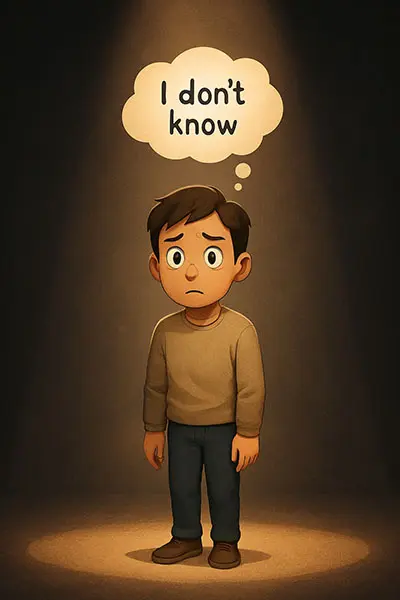
Common Situations That Trigger the Discomfort
This anxiety pops up in all sorts of places. Here are some common scenarios:
- Work Meetings or Interviews: You’re asked a tough question, and the pressure to sound competent makes you panic. I once stumbled through a job interview question, terrified I’d blown my shot.
- Parenting Moments: Kids ask big questions like, “Why do people fight?” and you feel you need a perfect answer.
- Social Gatherings: Among friends, you might avoid saying “I don’t know” to keep up with the group’s vibe.
- Romantic Relationships: During conflicts, you might feel you need to have all the answers to avoid looking weak.
- Personal Reflection: When thinking about your emotions or life direction, not knowing can feel like a personal failure.

For LGBTQ+ folks, these situations can be extra tricky in spaces where you feel judged for your identity, making it harder to admit uncertainty.
Common Situations That Trigger ‘I Don’t Know’ Anxiety
- Job interviews or professional settings
- Parenting when kids ask hard questions
- Social situations among peers
- Romantic relationships during conflict
- Even personal reflection about emotions or life direction
Practical Ways to Embrace Uncertainty
Ready to get comfy with saying “I don’t know”? Here are six practical steps to help you embrace uncertainty with confidence:
Acknowledge the Old Story
Your brain might’ve learned that not knowing equals danger. Acknowledge this by saying, “My brain’s trying to protect me, but I don’t need to know everything to be safe.” This helped me stop panicking during tough conversations. For more on reframing thoughts, check out our Self-Compassion Exercises.
Reframe “I Don’t Know” as Strength
Saying “I don’t know” isn’t weakness it’s honesty and a chance to learn. It opens the door to curiosity and collaboration. As Brené Brown says in Daring Greatly, “Vulnerability is the birthplace of innovation, creativity, and change.” Try it out next time you’re unsure, say, “That’s a great question, I’m still figuring it out.” Learn more at brenebrown.com.
Practice Small Admissions
Start in low-stakes situations, like with a trusted friend. Say, “I don’t know, but I’d love to hear your thoughts.” I tried this with my best friend when we were chatting about a movie, and it felt like a weight lifted off. Our Building Emotional Resilience guide has more tips.
Soothe Your Nervous System
When anxiety spikes, use grounding techniques. Try the 5-4-3-2-1 method: name 5 things you see, 4 you can touch, 3 you hear, 2 you smell, 1 you taste. Or do deep breathing: inhale for 4, hold for 4, exhale for 4. This calmed me down during a work presentation when I didn’t have an answer. Check out Grounding Techniques for Anxiety.
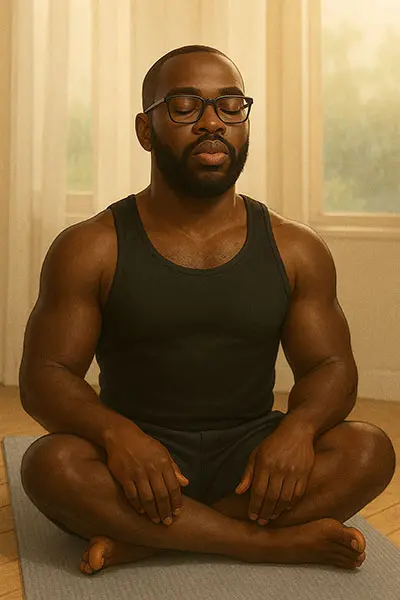
Let Go of Perfectionism
Your worth isn’t tied to knowing everything. Remind yourself, “I’m enough, even when I don’t have all the answers.” Journaling helped me let go of this pressure writing down my fears made them less scary. Try our Journaling for Mental Health prompts.
Embrace Curiosity Over Pressure
See “I don’t know” as an invitation to learn. Ask questions, explore, and let go of the need for instant answers. This mindset shift turned my anxiety into excitement when I started saying, “I don’t know, but let’s find out together!”
Navigating Related Discomforts in Communication and Connection
So, you’re starting to get comfy with saying “I don’t know” that’s huge! But what about those other moments when communication or connection feels like walking through a minefield? Maybe you freeze up talking to strangers, feel uneasy for no reason, or get super awkward when emotions come up. Oh man, I totally get it. 😅 These struggles are way more common than you think, and they can hit hard in different ways, whether it’s at work, with friends, or even just sitting in silence. In this section, we’ll tackle a bunch of related questions about why communication can feel so tough and how to ease into it with confidence. Let’s dive into these challenges with some practical tips and a bit of heart to help you feel more at ease
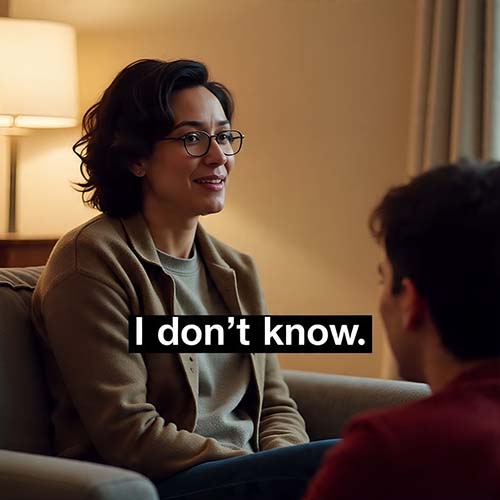
Saying “I Don’t Know” and the LGBTQ+ Experience {#lgbtq-experience}
For LGBTQ+ folks, saying “I don’t know” can feel like a bigger risk. Societal pressures like proving your worth in spaces that might judge your identity can make uncertainty feel like a weakness. Maybe you’ve been asked about your gender identity or coming out and felt you needed a perfect answer to avoid scrutiny. I know someone who avoided saying “I don’t know” at work because they feared it would reinforce stereotypes about their queerness.
Finding safe spaces like queer support groups or affirming therapists can make it easier to practice vulnerability. Resources like The Trevor Project offer support for navigating these pressures. You don’t have to have all the answers to be valid your authenticity is enough.
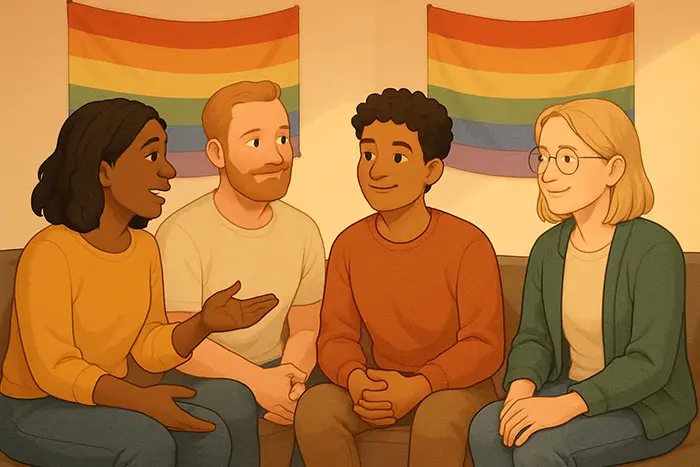
Q&A: Your Questions Answered
Q: Why does saying “I don’t know” feel dangerous?
A: Your nervous system might link uncertainty to a loss of safety or approval, especially if you’ve been judged before. For LGBTQ+ folks, this can be heightened by societal scrutiny. Practice grounding to feel safer, like in our Grounding Techniques for Anxiety.
Q: Will people lose respect if I admit I don’t know?
A: Often, the opposite! Honesty builds trust. Psychology Today says vulnerability fosters connection, not judgment.
Q: Can I fully overcome this anxiety?
A: Yes, with practice, you can get comfy with uncertainty. Small steps, like admitting “I don’t know” to a friend, build confidence over time.
Q: How do I handle this in professional settings?
A: Try saying, “I’ll look into that and get back to you.” It shows you’re proactive without faking it. Our Emotional Boundaries guide has more tips.
Q: Why is it harder for LGBTQ+ folks?
A: Societal pressures to “prove” yourself can make uncertainty feel riskier. Safe spaces, like those offered by The Trevor Project, can help you practice vulnerability.

Conclusion: You’re Allowed to Not Know Everything
Saying “I don’t know” doesn’t make you weak it makes you human. It’s a sign of honesty, curiosity, and courage. By letting go of the pressure to have all the answers, you open the door to growth, connection, and peace. As Brené Brown says, “Vulnerability is not winning or losing; it’s having the courage to show up and be seen.”
Take one small step today maybe say “I don’t know” in a low-stakes moment and see how it feels. You’ve got this! What’s one situation where you’ll try saying “I don’t know” this week? Share in the comments we’re cheering you on! 😊 For more ways to embrace your authentic self, explore our Self-Care Hub.

Why Am I So Uncomfortable Talking to People I Don’t Know?
Ever walk into a party or a networking event and feel your stomach do a flip just thinking about talking to someone new? For me, I used to dread those moments like at a work conference where I’d cling to my coffee cup, terrified I’d say something dumb. This discomfort often comes from social anxiety, where your brain sees strangers as potential threats to your social standing. According to Psychology Today, this fear of negative evaluation is super common, making every new interaction feel like a test.
Why It Happens:
- Fear of Judgment: You might worry strangers will find you boring, awkward, or “off.”
- Lack of Familiarity: Not knowing someone’s vibe or how they’ll react feels like stepping into the unknown.
- Past Rejections: If you’ve been shut down before like a time I got laughed at for a bad joke in high school your brain might be on high alert to avoid it again.
Practical Tips:
Reframe It: Remind yourself most people are too focused on themselves to judge you harshly. They’re probably just as nervous!
Start Small: Try low-stakes chats, like asking a barista about their day or saying hi to a coworker. These little wins build confidence.
Have Go-To Questions: Keep a few conversation starters handy, like, “What’s something fun you did this week?” It takes the pressure off.
Ground Yourself: Before talking, try deep breathing (inhale for 4, hold for 4, exhale for 4) to calm your nerves. Our Grounding Techniques for Anxiety guide has more ideas.

Why Do I Feel Uncomfortable for No Reason?
Sometimes, you might feel uneasy without a clear trigger like a vague sense of dread that creeps in outta nowhere. I’ve had days where I’d be sitting at my desk, everything seeming fine, but this weird tension would just hit me. It’s like, “What’s wrong with me?” This could be tied to generalized anxiety disorder (GAD) or heightened sensitivity to your environment, as noted by Mayo Clinic.
Why It Happens:
- Underlying Anxiety: GAD can cause persistent discomfort, even without an obvious cause.
- Sensory Overload: If you’re sensitive to noise, crowds, or subtle social cues, your nervous system might misread these as threats.
- Unprocessed Emotions: Past stress or trauma can linger in your body, causing unexplained unease.
Practical Tips:
- Use the 5-4-3-2-1 Method: Name 5 things you see, 4 you can touch, 3 you hear, 2 you smell, 1 you taste to ground yourself in the moment.
- Track Patterns: Keep a journal to note when these feelings pop up. I found mine often hit after long workdays, which helped me plan better.
- Talk to a Therapist: If it’s persistent, a professional can help uncover the root cause. BetterHelp offers therapists who get it.
Why Do I Feel Uncomfortable Being Seen?
Ever feel like you wanna disappear when all eyes are on you like during a presentation or even walking into a crowded room? I used to get this tight feeling in my chest every time I had to speak up in a meeting, worried everyone was judging my every move. This visibility anxiety often comes from self-consciousness or fear of rejection.

Why It Happens:
Past Criticism: If you’ve been criticized before like a teacher calling out a wrong answer it can make attention feel threatening.
Self-Consciousness: You might worry about how you look, sound, or act, fearing others will spot flaws.
Fear of Rejection: Being seen can feel risky if you’re scared of not being accepted.
Practical Tips:
- Practice Self-Compassion: Say to yourself, “I’m enough, just as I am.” Try a self-compassion break: place a hand on your heart and say, “It’s okay to be seen.”
- Reframe Attention: See it as curiosity, not judgment. People are often more interested than critical.
- Start Small: Practice being seen in low-stakes settings, like sharing a story with a friend. Check out our Building Self-Compassion guide for more.
Why Do I Struggle with Communicating or Talk Awkwardly?
If you find yourself stumbling over words or avoiding conversations, you’re not alone. I used to overthink every word, which made me sound like a robot or just plain awkward. This communication apprehension often comes from a lack of confidence or fear of being misunderstood.
Why It Happens:
- Fear of Misunderstanding: You might worry your words won’t come out right or will be taken the wrong way.
- Social Anxiety: The pressure to perform in conversations can make you freeze or ramble.
- Lack of Practice: If you’re not used to expressing yourself, it can feel unnatural.
Practical Tips:
- Slow Down: Take a breath before speaking to gather your thoughts. Pausing helped me sound clearer.
- Practice Active Listening: Focus on what the other person’s saying instead of planning your response. It takes the pressure off.
- Join a Support Group: Spaces like Toastmasters can help you practice speaking confidently.
Why Do Emotions Make Me So Uncomfortable?
Emotions can feel like a wild ride, especially if you’re not used to sitting with them. I used to bottle up my feelings, thinking they’d make me look weak, but that just made me more uneasy. This discomfort often comes from emotional suppression or fear of vulnerability.
Why It Happens、学:
- Learned Suppression: If you grew up hearing “don’t cry” or “be strong,” you might see emotions as weakness.
- Fear of Losing Control: Strong emotions can feel overwhelming, like they’ll take over if you let them out.
- Lack of Emotional Literacy: Not knowing how to name or process emotions can make them feel foreign.
Practical Tips:
- Learn Emotional Vocabulary: Practice naming your feelings, like “I’m frustrated” or “I’m anxious.” This makes them less scary.
- Journal Your Emotions: Write about what you’re feeling without judgment. Our Journaling for Mental Health guide has prompts to get started.
- Practice Vulnerability: Share a small feeling with a trusted friend to build comfort with emotions.

Why Do I Make Others Uncomfortable by Not Talking?
If people say your silence makes them uneasy, it might be because they misread it as disinterest or judgment. I’ve had friends tell me I seem “too quiet,” but it’s just how I process things listening more than talking.
Why It Happens:
- Social Norms: Many cultures value talkativeness as friendliness, so silence can seem off-putting.
- Misinterpretation: Your quietness might be read as disapproval or aloofness.
- Your Own Anxiety: If you’re nervous, you might come across as tense, which others pick up on.
Practical Tips:
- Communicate Your Style: Let others know, “I’m more of a listener, but I’m totally engaged.”
- Ask Questions: Show interest with open-ended questions, like, “What’s been going on with you?”
- Smile or Nod: Small non-verbal cues can signal you’re present, even if you’re not talking much.
Why Is Communicating Feelings So Hard?
Expressing emotions can feel like walking a tightrope, especially if you’re worried about being judged or misunderstood. I used to hold back because I didn’t want to “burden” others with my feelings.
Why It Happens:
- Fear of Rejection: You might worry that sharing your feelings will push people away.
- ** লack of Practice:** If you’re not used to expressing emotions, it can feel unnatural or awkward.
- Cultural Barriers: Some cultures discourage open emotional expression, which can make it harder.
Practical Tips:
- Use “I” Statements: Say, “I feel hurt when…” instead of blaming others. This keeps it safe and clear.
- Start Small: Share minor feelings, like, “I’m a bit stressed today,” with someone you trust.
- Seek Therapy: A therapist can help you practice emotional expression. BetterHelp is a great place to start.
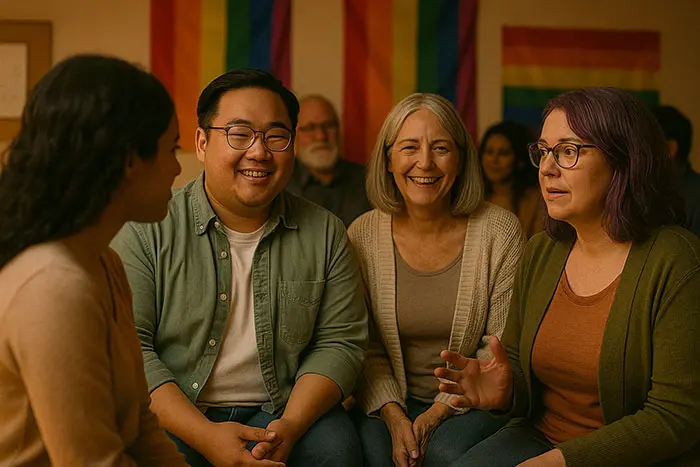
Why Do I Feel Uncomfortable in Silence?
Silence during conversations can feel like a void you need to fill, but it’s often more about your own anxiety than the situation itself. I used to feel the need to keep talking to avoid awkward pauses, but that just made me more anxious.
Why It Happens:
- Social Pressure: Many of us feel we need to keep conversations flowing without pauses.
- Anxiety About Perception: You might worry silence makes you seem boring or disengaged.
- Internal Discomfort: If you’re uncomfortable with your own thoughts, silence can feel threatening.
Practical Tips:
- Embrace the Pause: See silence as a natural part of conversation. It’s okay to take a moment to think.
- Use It to Your Advantage: Let the other person fill the silence, which can reveal more about their thoughts.
- Practice Mindfulness: Use silence as a chance to check in with yourself. Our Mindfulness for Beginners guide can help.
Saying “I Don’t Know” and the LGBTQ+ Experience
For LGBTQ+ folks, saying “I don’t know” or navigating communication challenges can feel extra loaded due to societal pressures. If you’ve faced judgment or rejection for your identity, admitting uncertainty or expressing emotions might feel like giving critics more to work with. Finding safe spaces like queer support groups or affirming therapists can make it easier to practice vulnerability. Resources like The Trevor Project offer tailored support for these experiences.
Conclusion: Embracing Your Unique Communication Style
Navigating communication doesn’t have to feel like a battle. Whether it’s talking to strangers, sitting with emotions, or embracing silence, these challenges are part of being human. By taking small steps like practicing “I don’t know” or pausing to breathe you can build confidence and ease. As Brené Brown says, “Vulnerability is not winning or losing; it’s having the courage to show up and be seen.” So, what’s one thing you’ll try this week to feel more comfortable in your own skin? Share it in the comments we’re cheering you on! 😊 For more ways to nurture yourself, explore our Self-Care Hub.

Related articles that I recommend you read
- Self-Care Hub: Must-Know Self-Care Practices for Your 20s to 40s
- Mindfulness for Stress Relief
- Emotional Intelligence Guide
Reliable sources for preparing part of this article
✨ Last updated on 30.08.2025
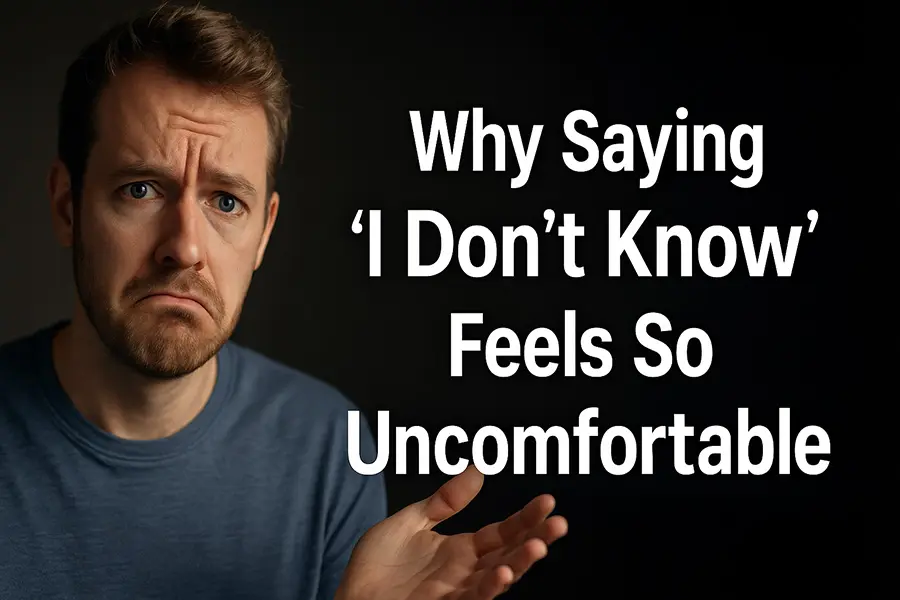










Leave a Reply